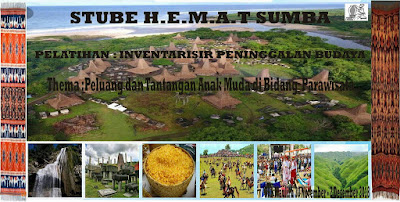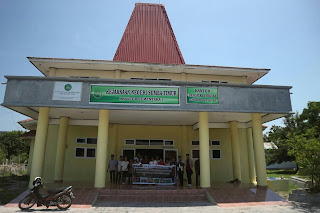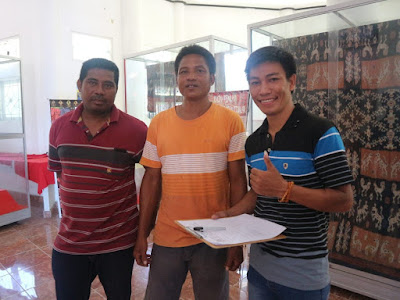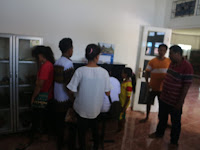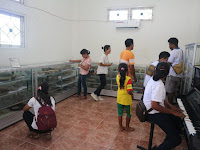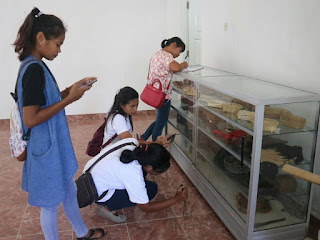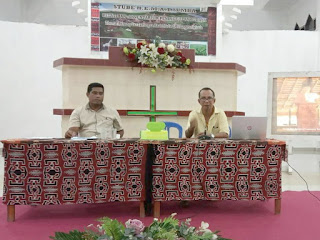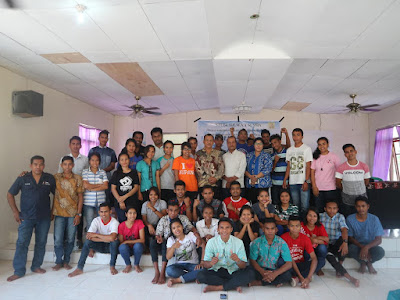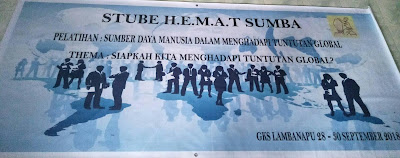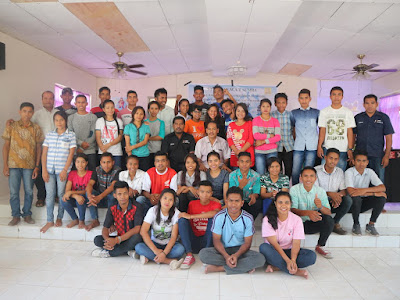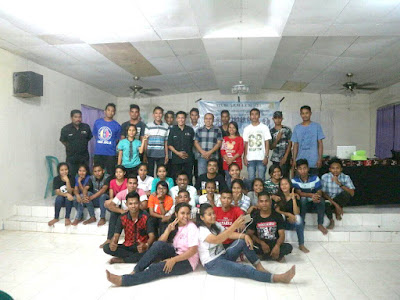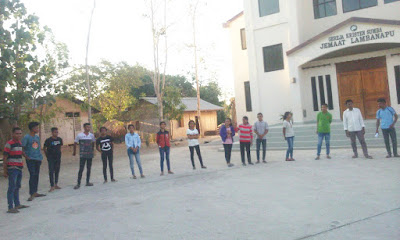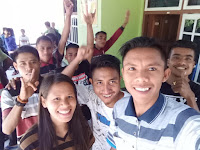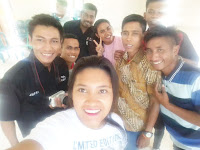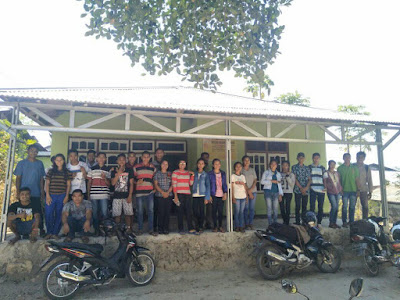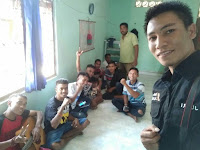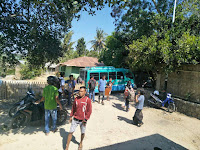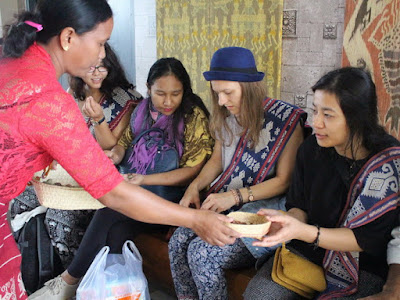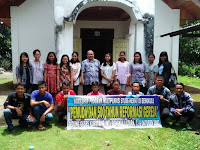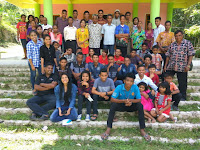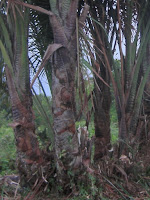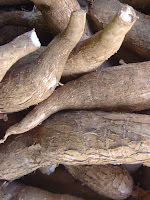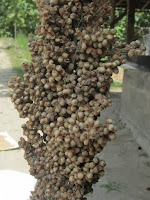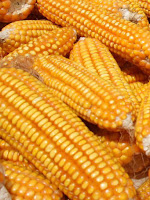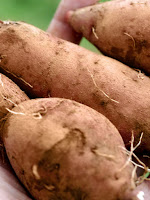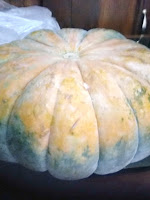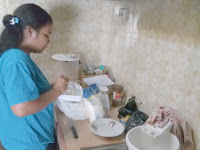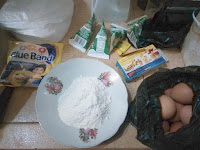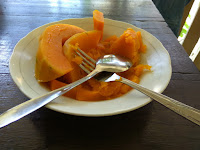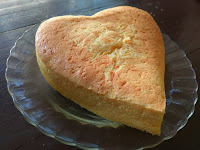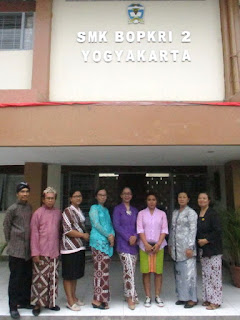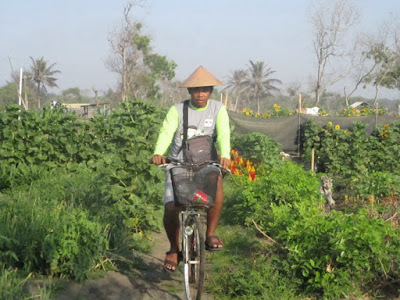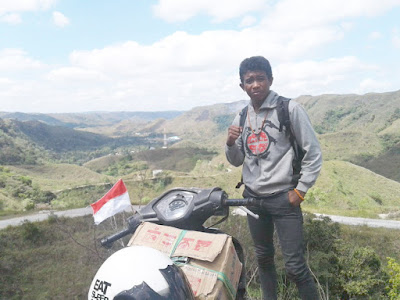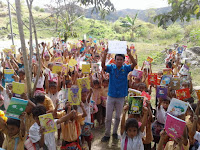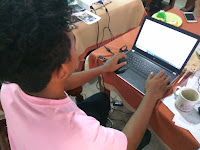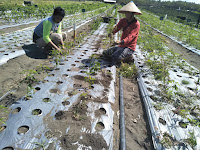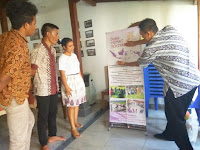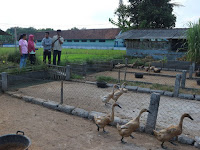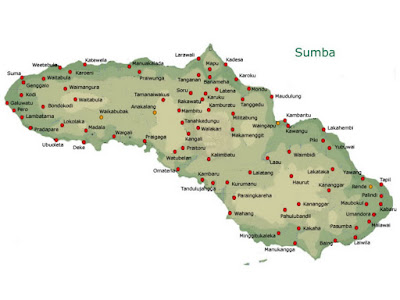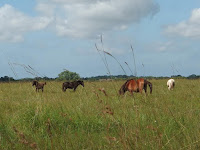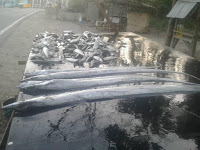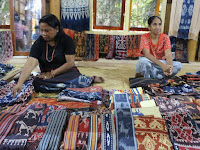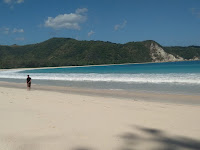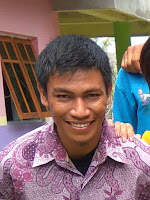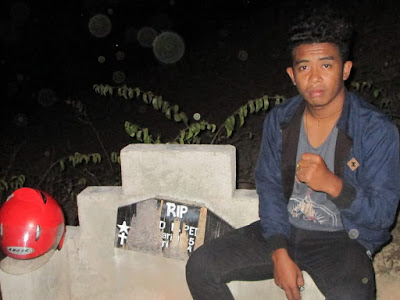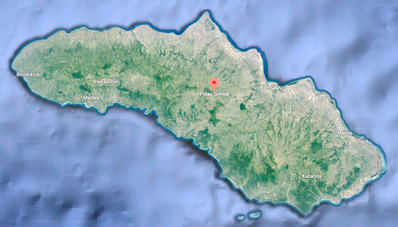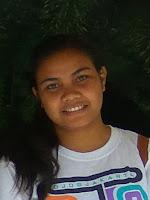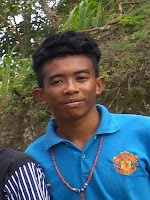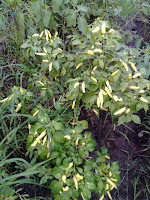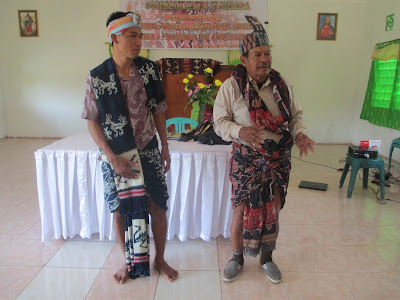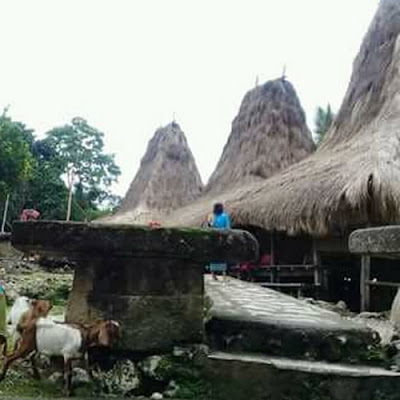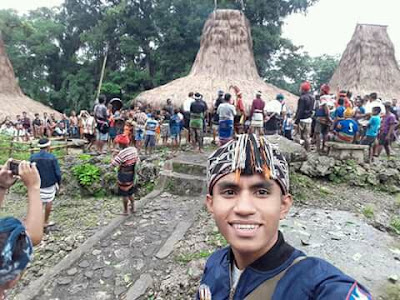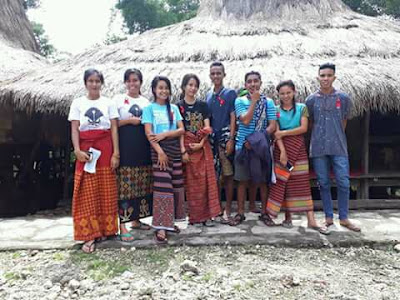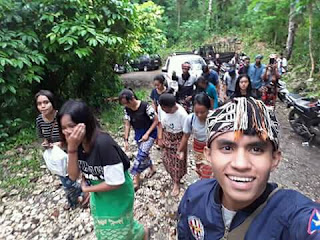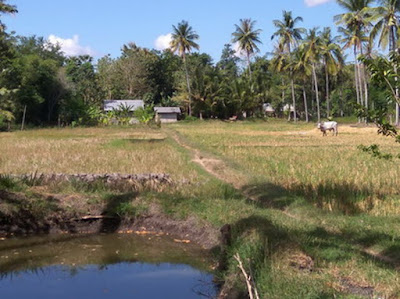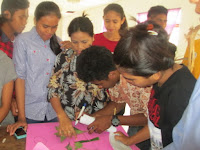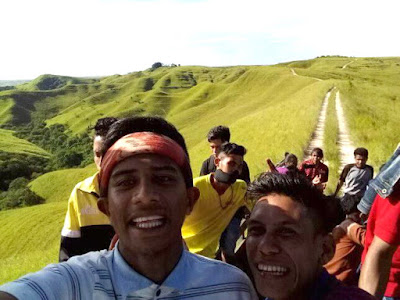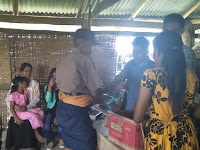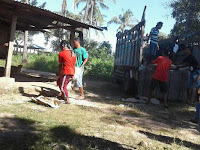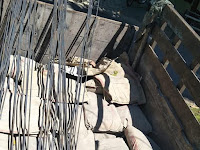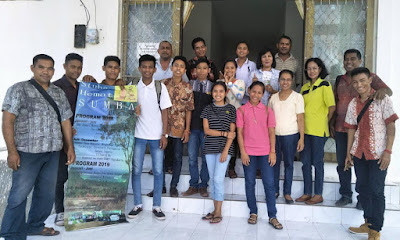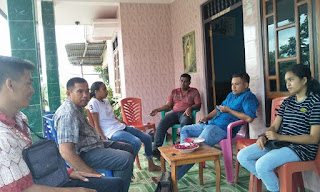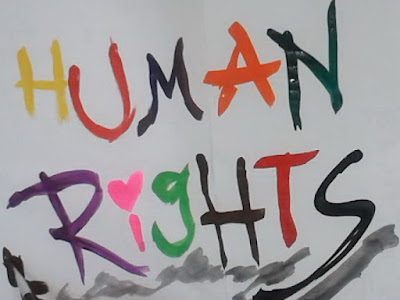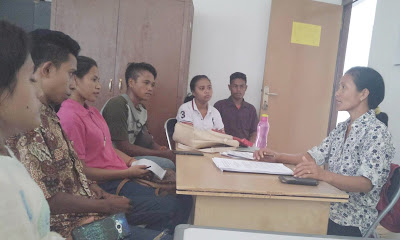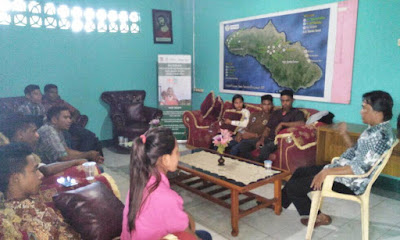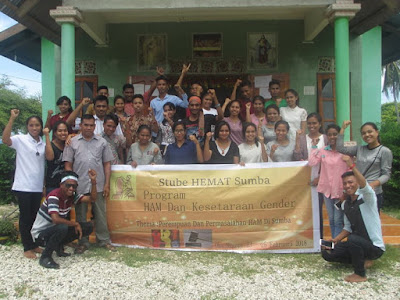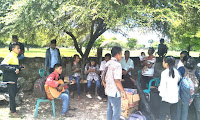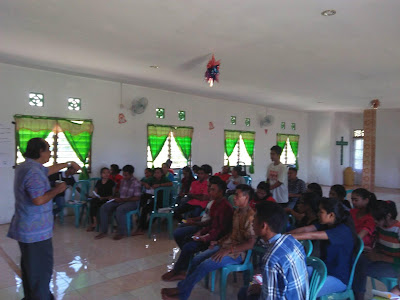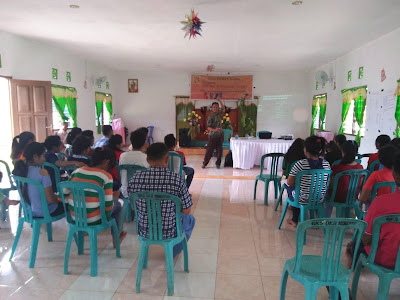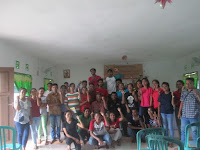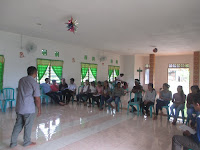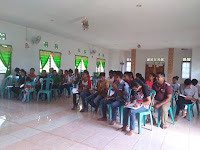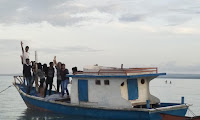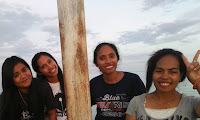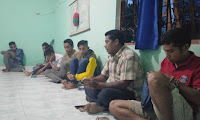Students serve their villages: Yes, we can! (2) Participants’ experiences of Village and Me program
Monday, 31 December 2018by adminstube
The progress of young people, especially students from Sumba who took part in Village and Me program from Stube-HEMAT Sumba aroused the enthusiasm of other students to participate in the next period. Their attention to their village was blooming and their fresh ideas sprung up. This has aroused optimism because more and more young people care and have spirit to build their villages which have common 'image' as lagging region. It willslowly decrease.
The second group in 2018 involved three Stube-HEMAT Sumba activist students to give their knowledge and experience during their study to their village communities spread across various regions of Sumba. They have confidence and trust that what they are doing is beneficial.
Adriana Pindi Moki, often called Ambu, conducted health education for people in her village in Waikanabu, Tabundung, East Sumba. As a nursing student at Nursing Academy of Waingapu, she was so skillful when giving counseling on family planning and health checks for couples of childbearing age and children. She also provided leaflets about maternal and child health. Those were very valuable because village people which far from city get useful reading. They responded well Ambu’s initiative to share her knowledge in health aspect and hope other students will come and share knowledge.
Trias Manu, a student from Mauhau village, East Sumba shared knowledge he learned at State Community Academy (AKN) of Waingapu majoring in Animal Feed. He practiced making liquid and solid organic fertilizers in GKS Mauhau GKS with the church members, mostly farmers. They are still using their own organic fertilizer until now. "This activities teaches me to share, not to be desperate with our limitation. Initially I was nervous and confused to start the activity, but afterfinishing all, I finally felt happy because my knowledge maybe useful," said Trias.
Makson Rangga Nduna, an activist of Stube-HEMAT Sumba,studying Development Economics in Unkriswina Sumba was interested in providing assistance to vegetable farmers around his village in Karaha, Lambanapu. He is a student and also a vegetable farmer who has additional knowledge about organic farming from several training sessions at Stube-HEMAT Sumba. The plants he cultivated there include mustard, basil, long beans, eggplant, cassava, papaya, banana, spinach, lemongrass and cattle feedgrass.
"I like this program because it matches with my hobby and background as farmer's family. The yields can cover some of the family's vegetable needs, some are sold and the money is used to buy other needs. It becomes examples for other farmers. But I also faced cattle disturbance because the owners release them and the cattle often eat plants, so the yield is not optimal. We keep on looking for ways to prevent our crops damaged by cattle, such as giving fences and encouraging cattle owners to monitor their livestock", said Makson.
Evidently, when students get support and opportunity to share knowledge they got in campus, they are able to do it. Hopefully these activities become way of blessings. (TRU).
Youth and Tourism Industry As if two sides of a coin
Monday, 10 December 2018by adminstube
Every region has their own uniqueness that has become their trademark. This uniqueness can be seen from nature, scenery, architecture, buildings or historic and cultural heritage that differs in shape and ornament from one region to another. It is critical for youth to know and understand their region’s historical and cultural heritage, especially in Sumba’s booming tourism industry.
As a continuation of the Cultural Heritage: Inventorying Cultural Heritages, Stube-HEMAT Sumba facilitates Sumbanese youth and undergraduates to visit Eastern Sumba regional museumon Saturday, December 8th,2018. On this visit, participants observe the collections inside the Eastern Sumba museum belongs to Department of Tourism. This collection includes ‘hinggi’ (traditional woven fabric), ‘ngohung’ (mortar), ‘tanga watil’ (betel nut placeholder), ‘kalumbut’ (betel nut placeholder for males), parang (blades), ‘jungga’ (traditional guitar), ‘makka’ (spinning top toy), ‘lamba’ (drum), gong, ‘mamuli’ (wedding dowry), and other collections.
 Umbu Kura Lena, museum’s speaker conveys that NTT provincial government is campaigning tourism as a leading sector to develop other sectors. Therefore, various elements must participate actively within it, especially youths and undergraduates that has themotivation and fresh ideas. They are expected to be the man behind the wheel of the tourism industry.
Umbu Kura Lena, museum’s speaker conveys that NTT provincial government is campaigning tourism as a leading sector to develop other sectors. Therefore, various elements must participate actively within it, especially youths and undergraduates that has themotivation and fresh ideas. They are expected to be the man behind the wheel of the tourism industry.In response to that information, Apriyanto Hangga, one of the Stube-HEMAT Sumba’s team, revealed his dream that the museum completes its collection, because the museum’s collection is less than 50% of Sumbanese historical and cultural heritage. He explains that some objects, e.g. ‘katoda’ (stone altar that is used by ‘Marapu’ -a local Sumbanese belief- believers),jewelry (e.g. rings, bracelets, vases, and crowns), hunting spears, etc. He also criticizes the local government’s slowness on building a museum and their difficulties on gathering their collection due to the fact that many Sumbanese cultural and heritage objects that went for sale outside Sumba, even overseas.
Sepritus Tangaru Mahamu, one of the participants, currently studying at AKN Waingapu, expressed his delight to be able to see heritage objects with his own eyes inside this museum. Prior to its establishment, he’s only able to listen to stories of traditional musical instruments like ‘djungga’ or guitar. Turns out he’s not the only one, there’s still plenty of youth who has never seen that musical instrument, not to mention playing it. Djungga lost its popularity competing with modern guitars that have more variation in tones. Right now, he’s enterprising on selling Sumbanese delicacies e.g. ‘kaparak’ and Sumbanese shawl. Even if it’s on a small scale, he believed that it will act as a stepping stone to be youth that steers the wheel of Sumbanese tourism industry.
At the end of the visit, the participants held a reflection and catalogednature tourism spots inside Sumba. Other than that, they will also write a story thatdescribes these spots as a form of advertising. Youth as the region’s next generation needs to be sensitive on tourism opportunities and become the initiator for its development, this sector can even be a job alternative as a tourism entrepreneur and job opportunity for others. (JUF)
Promoting Tourism, Advancing the Economy of Sumba
Monday, 3 December 2018by adminstube


 Sumba is rich with tourism potencies, covering beaches and sea waves, pasola, traditional costumes and houses, stone graves, dances, music and songs, and savannas. But these have not been seen and responded maximally by Sumba community as tourist attraction that can improve the economy of Sumba. Actually Sumba still has more other interesting things to be developed. Stube-HEMAT Sumba as student-mentoring institution and young people from Sumba took an initiative to hold a training on "Tourism: Cultural Heritage Inventory" with a theme "Opportunities and challenges for young people in the field of tourism", took place at GKS Mauliru, on Nov 30 - Dec 2, 2018.
Sumba is rich with tourism potencies, covering beaches and sea waves, pasola, traditional costumes and houses, stone graves, dances, music and songs, and savannas. But these have not been seen and responded maximally by Sumba community as tourist attraction that can improve the economy of Sumba. Actually Sumba still has more other interesting things to be developed. Stube-HEMAT Sumba as student-mentoring institution and young people from Sumba took an initiative to hold a training on "Tourism: Cultural Heritage Inventory" with a theme "Opportunities and challenges for young people in the field of tourism", took place at GKS Mauliru, on Nov 30 - Dec 2, 2018.
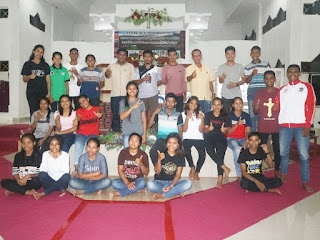 Two dozens of students from various campuses in East Sumba attended the training. Competent figures in their field facilitate it, such as Yudi Umbu Rawambaku, SE from Tourist Office of East Sumba district who delivered a material ‘The role of the government in developing community-based tourism in increasing local revenue (PAD) '. He said that Sumba's culture as an ancestral heritage needs to be preserved authenticity and free from outside cultural influences, as well as the uniqueness of Sumba's nature as the island's wealth. We should not sell what we have to foreigners so that we will only be guests or spectators in our own land. "The government has tried to develop community-based tourism by providing assistance to cloth weavers, providing musical instruments, building traditional houses, and managing natural potencies, such as beaches and waterfalls. The progress that be realized can not be separated from the support and participation of the community, such as the 1001 horse parade and the weaving exhibition. It proved that the government strongly supported the development of tourism as one of the economic drivers," he said further.
Two dozens of students from various campuses in East Sumba attended the training. Competent figures in their field facilitate it, such as Yudi Umbu Rawambaku, SE from Tourist Office of East Sumba district who delivered a material ‘The role of the government in developing community-based tourism in increasing local revenue (PAD) '. He said that Sumba's culture as an ancestral heritage needs to be preserved authenticity and free from outside cultural influences, as well as the uniqueness of Sumba's nature as the island's wealth. We should not sell what we have to foreigners so that we will only be guests or spectators in our own land. "The government has tried to develop community-based tourism by providing assistance to cloth weavers, providing musical instruments, building traditional houses, and managing natural potencies, such as beaches and waterfalls. The progress that be realized can not be separated from the support and participation of the community, such as the 1001 horse parade and the weaving exhibition. It proved that the government strongly supported the development of tourism as one of the economic drivers," he said further. The topic on The Readiness of Youth and Management was presented by Windy Paskawati Suwarno, S.I.Kom. M.Sc., a lecturer at Unkriswina Sumba. She said the tourism sector drives other sectors to move, such as agriculture, animal husbandry, fisheries, hospitality and so on. Tourists who come to Sumba certainly need accommodation, entertainment, transportation, culinary, and souvenirs. But in Sumba tourist map, only Pasola and traditional houses were seen. That means tourism stakeholders on Sumba have not been able to provide needs that support tourism. Young people seem confused to find flagship products that can be developed from the island. They need to know how to identify tourism development, for example with SWOT analysis (strengths, weaknesses, opportunities and threats).
The topic on The Readiness of Youth and Management was presented by Windy Paskawati Suwarno, S.I.Kom. M.Sc., a lecturer at Unkriswina Sumba. She said the tourism sector drives other sectors to move, such as agriculture, animal husbandry, fisheries, hospitality and so on. Tourists who come to Sumba certainly need accommodation, entertainment, transportation, culinary, and souvenirs. But in Sumba tourist map, only Pasola and traditional houses were seen. That means tourism stakeholders on Sumba have not been able to provide needs that support tourism. Young people seem confused to find flagship products that can be developed from the island. They need to know how to identify tourism development, for example with SWOT analysis (strengths, weaknesses, opportunities and threats). Then, the material about opportunities, strategies to start and develop a business in the field of tourism was presented by Martin K. Mbaha, a business actor and legislative member of East Sumba regency. He reminded participants that tourism actor is all of us. As young people, should not think small, pessimistic, unable, but should be able to provide what this area needs.
Then, the material about opportunities, strategies to start and develop a business in the field of tourism was presented by Martin K. Mbaha, a business actor and legislative member of East Sumba regency. He reminded participants that tourism actor is all of us. As young people, should not think small, pessimistic, unable, but should be able to provide what this area needs.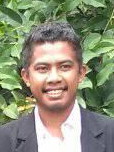 Deriatus Awa, a theology student of STT GKS Lewa told us that Sumba, known as the Sandelwood horse, cannot be separated from the savannah and weaving as the island's wealth. The Sumbanese are proud when the island becomes tourists’ destination, but they have not seen this as an opportunity. Through the training he admitted that his insight was open to know opportunities in tourism sector for a better economy in Sumba in the future.
Deriatus Awa, a theology student of STT GKS Lewa told us that Sumba, known as the Sandelwood horse, cannot be separated from the savannah and weaving as the island's wealth. The Sumbanese are proud when the island becomes tourists’ destination, but they have not seen this as an opportunity. Through the training he admitted that his insight was open to know opportunities in tourism sector for a better economy in Sumba in the future.Let's take a look at the available opportunities, take an option of businesses related to tourism and use social media optimally to promote Sumba, so that tourism in Sumba is growing and people's welfare is increasing. (JUF).
Ready to Face Global Demand? Human Resource Facing Global Demand
Sunday, 30 September 2018by adminstube
Globalization and free trade make business competition more intense. At the macro level, the government needs to improve human resources competence through education quality improvement programs, while at the micro level, companies need to adopt the appropriate vision, mission and strategy.
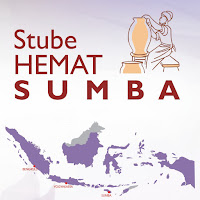 A training on human resource discussing about facing global demand with a theme 'Ready to Face Global Demand?' was held by Stube-HEMAT Sumba in GKS Lambanapu on September 28-30, 2018. It was attended by forty trainees consisting of students from several campuses such as Unkriswina Sumba, STT GKS Lewa, STT Terpadu Waingapu, Nursing Academy of Waingapu and PDD East Sumba.
A training on human resource discussing about facing global demand with a theme 'Ready to Face Global Demand?' was held by Stube-HEMAT Sumba in GKS Lambanapu on September 28-30, 2018. It was attended by forty trainees consisting of students from several campuses such as Unkriswina Sumba, STT GKS Lewa, STT Terpadu Waingapu, Nursing Academy of Waingapu and PDD East Sumba.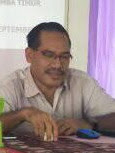 Ruben Nggulindima, S.Sos., M.Pd, the secretary of education departement of East Sumba presented a topic on ‘The role of local government in improving human resources'. Nowadays the regional government of East Sumba Regency is pushing to increase elementary school buildings by implementing one elementary school per 4 kms, one junior high school per 5 kms, as well as improving educators’ quality by providing training for teachers and increasing teachers’ welfare.
Ruben Nggulindima, S.Sos., M.Pd, the secretary of education departement of East Sumba presented a topic on ‘The role of local government in improving human resources'. Nowadays the regional government of East Sumba Regency is pushing to increase elementary school buildings by implementing one elementary school per 4 kms, one junior high school per 5 kms, as well as improving educators’ quality by providing training for teachers and increasing teachers’ welfare.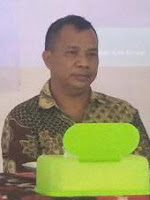 The office of manpower and transmigration sent Donatus Hadut, SH, the secretary, to deliver a material on preparing reliable workforce in facing global markets and labor opportunities. Currently in Sumba there are eight hundred job opportunities available to work at PT Muria Sumba Manis (MSM) which opens the second largest sugar caneplantation and factory in Indonesia. This project will recruit around seven thousand people until 2019 and the recruitment is still in process. For those who want to work at PT MSM the opportunity is open now and it is also facilitated by the department of manpower and transmigration.
The office of manpower and transmigration sent Donatus Hadut, SH, the secretary, to deliver a material on preparing reliable workforce in facing global markets and labor opportunities. Currently in Sumba there are eight hundred job opportunities available to work at PT Muria Sumba Manis (MSM) which opens the second largest sugar caneplantation and factory in Indonesia. This project will recruit around seven thousand people until 2019 and the recruitment is still in process. For those who want to work at PT MSM the opportunity is open now and it is also facilitated by the department of manpower and transmigration.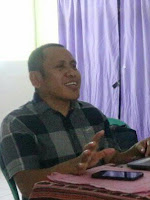 Umbu Ho Ara, SE. M.Si, with a topic on ‘Encouraging the competitiveness of the regional economy in facing global markets’ explained about competitiveness by creating the ability to face the challenge of international market competition and increasing real income. Globalization boreInternational Monetary Fund (IMF) which increases interdependence, World Bank, freedom and ability of individuals and companies to initiate economic transactions. Free market globalization becomes a market that cannot be intervened by state policy.
Umbu Ho Ara, SE. M.Si, with a topic on ‘Encouraging the competitiveness of the regional economy in facing global markets’ explained about competitiveness by creating the ability to face the challenge of international market competition and increasing real income. Globalization boreInternational Monetary Fund (IMF) which increases interdependence, World Bank, freedom and ability of individuals and companies to initiate economic transactions. Free market globalization becomes a market that cannot be intervened by state policy.At the end of the training, Shantaria A.R Nodu, a training participant said, "I am new to know about Stube-HEMAT Sumbahowever I feel very happy to participate in it, because I learn deeper about human resource in facing global challenges. Besides that, I am proud because I was chosen as participant among students in Sumba. Hopefully in the next training I have another opportunity to take part".
The expectation coming out of the training is the government and the private sectors can work together better to develop Sumba. Through this training, students are enabled to observe available opportunities to develop themselves, even to open jobs for others. (YAW).
Pahappah for Indonesia
Saturday, 8 September 2018by adminstube
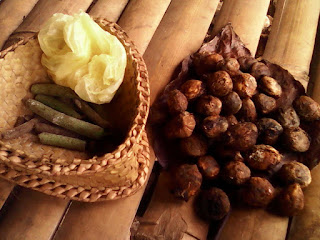 A warm greetings from the Sumbanese manifested inoffering and giving betel nut for everyone who visits theirhouse in Sumba,is calledPahappah. This practice isthe characteristic of the island which is carried out from one generation to the next generation. Pahappahitself consists of betel, areca nut and lime betel. When these three elements are chewed together in our mouth, they will produce red color and special taste. Areca nut, which tastes 'sepat' (a kind of taste when tongue feels drying), betel nut that causes spicy, and lime betel that can cause a burning sensation in our tongue, willfuse to produce a unique taste and benefit to strengthen teeth so that they are not easily broken.
A warm greetings from the Sumbanese manifested inoffering and giving betel nut for everyone who visits theirhouse in Sumba,is calledPahappah. This practice isthe characteristic of the island which is carried out from one generation to the next generation. Pahappahitself consists of betel, areca nut and lime betel. When these three elements are chewed together in our mouth, they will produce red color and special taste. Areca nut, which tastes 'sepat' (a kind of taste when tongue feels drying), betel nut that causes spicy, and lime betel that can cause a burning sensation in our tongue, willfuse to produce a unique taste and benefit to strengthen teeth so that they are not easily broken.
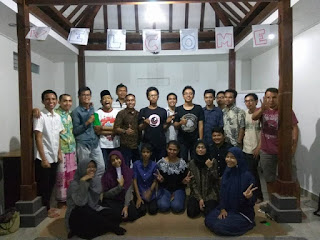 Pahappah is an illustration of the diversity and distinctiveness of areas in Indonesia. This diversity also can be found in any discussion forum or training from Stube-HEMAT attended by students from various regions such as Sumatera, Maluku, Lembata, Atambua, Sumba, Halmahera, Yogyakarta, and other regions. These diversities are like the elements of Pahappah, if they understand their function and task to complement each other, it brings extraordinary strength for the nation.
Pahappah is an illustration of the diversity and distinctiveness of areas in Indonesia. This diversity also can be found in any discussion forum or training from Stube-HEMAT attended by students from various regions such as Sumatera, Maluku, Lembata, Atambua, Sumba, Halmahera, Yogyakarta, and other regions. These diversities are like the elements of Pahappah, if they understand their function and task to complement each other, it brings extraordinary strength for the nation.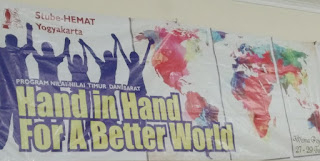 The follow-up activity of Western and Eastern Values training, attended by students from various denominations of beliefs, cultural background, gender, as well as the background of the study, like the elements of unified Pahappah. The awareness of interacting, exchanging, sharing and understanding each other is a great asset tomaintain unity and peace. Likewise Western and Eastern Values are not only something to be debated, but values to find out ameeting point after exploring elements that promote humanity and human rights. (MR).
The follow-up activity of Western and Eastern Values training, attended by students from various denominations of beliefs, cultural background, gender, as well as the background of the study, like the elements of unified Pahappah. The awareness of interacting, exchanging, sharing and understanding each other is a great asset tomaintain unity and peace. Likewise Western and Eastern Values are not only something to be debated, but values to find out ameeting point after exploring elements that promote humanity and human rights. (MR).
Cultivating motherland Eat what you planted!
Saturday, 8 September 2018by adminstube
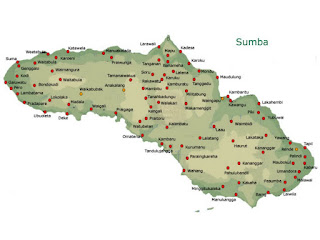 Indonesia has potencies to produce various culinary from local crops. The variety of culinary can be developed in line with the rapid ofdevelopment in the tourism sector. In the progress oftourism with more and more tourist destination in Indonesia, Sumba island should begin to think the culinary variety of its farmers’ local harvest as an important part to welcome guests. Unfortunately when the food is displayed in certain moment, the performance is still insimple way with the cooking process of boiling or frying, without appetizing dishes and nice packaging.
Indonesia has potencies to produce various culinary from local crops. The variety of culinary can be developed in line with the rapid ofdevelopment in the tourism sector. In the progress oftourism with more and more tourist destination in Indonesia, Sumba island should begin to think the culinary variety of its farmers’ local harvest as an important part to welcome guests. Unfortunately when the food is displayed in certain moment, the performance is still insimple way with the cooking process of boiling or frying, without appetizing dishes and nice packaging.
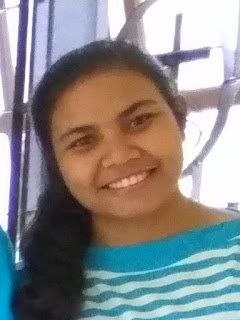 Observing opportunities in the future, Meliani Retang, a student of STT GKS took opportunity to explore the cobwebs of processing local crop products by participating in the exposure program to Stube-HEMAT Yogyakarta. Besides theology, Meliani got additional experiences as additional knowledge other thanserving sermons by developingeconomic of church members through productive efforts by processing local crops to various foods, such as, cakes from pumpkin, corn flour, cassava flour, banana flour or sticky rice flour. They are notless delicious than cakes from wheat flour. By modern packaging and marketing, the local products can be the regional flagship products.
Observing opportunities in the future, Meliani Retang, a student of STT GKS took opportunity to explore the cobwebs of processing local crop products by participating in the exposure program to Stube-HEMAT Yogyakarta. Besides theology, Meliani got additional experiences as additional knowledge other thanserving sermons by developingeconomic of church members through productive efforts by processing local crops to various foods, such as, cakes from pumpkin, corn flour, cassava flour, banana flour or sticky rice flour. They are notless delicious than cakes from wheat flour. By modern packaging and marketing, the local products can be the regional flagship products.
In addition to the motivations provided by the board in charge of Stube-HEMAT and Ariani Narwastujati as executive directors, Stube-HEMATcontinues to support its activists bynetworks and opportunities. Kristiana Triwulan, a teacher of cooking atvocational school of BOPKRI 2 Yogyakarta became one of the networks where Meliani studied and practiced processing local ingredients. As a theology student, Meliani was also given a chance to convey morning reflections to teachers and students before teaching and learning activities began. There were many things that could be learned at this school. Besides learninghow to cook foods, she also learned how to choose qualifiedingredients to be cooked, even how to package and to serve creatively to make consumers were interested to buy.
“Eat what you planted” becomes an encouragement to love local products besides keeping one’s mental for food independence. Of course, this process toward such awareness is a bit disturbing the comfort that has been felt before. However, in any inconvenience, there must be a process of thinking to be more creative to answer the existing challenges. (MR).
Children, Next Generation As National Asset Village and Me Program
Friday, 31 August 2018by adminstube
Children are human beings or individuals having various inner potencies that need to be developed in their lives. They are also next generation of leadership for this nation, therefore, they need to be trained and guided to develop their ideas. The understanding on how valuable a child is not yet fully understood by every parents.
One of the social problems that occurred in Rakawatu village, my home village, is the lack of concern of parents to children's education. This situation does not support children's intellectual development as the next generation of Sumba as well as this nation. They should get chance and strong support from their parents for proper and good education. This is a challenge for me from Rakawatu to do something useful for the children in my village during college breaks. Finally, I encouraged myself to propose as participant in ‘Village and Me’ program, one of Stube-HEMAT Sumba programs.
 Stube-HEMAT Sumba is a youth and student mentoring institution in Sumba that concern in building awareness to understand the surroundings problems. ‘Village & Me’ program provided opportunities for young people and students to develop themselves and understand social issues around them by sending students back to their villages to carry out activities that benefit for the community.
Stube-HEMAT Sumba is a youth and student mentoring institution in Sumba that concern in building awareness to understand the surroundings problems. ‘Village & Me’ program provided opportunities for young people and students to develop themselves and understand social issues around them by sending students back to their villages to carry out activities that benefit for the community.
After several meetings and discussions with Stube-HEMAT Sumba team about the program, finally on August 1, 2018, Stube-HEMAT Sumba sent me to Sumba Christian Church (GKS) of Rakawatu, Lewa to carry out activities for children in my village. I wanted to share and learn with Sunday school children at GKS Rakawatu.
 I designed an activity that can be a media for children to express children's aspirations and self-actualization in arts, so that their ideas can be developed through their creativity. The activities were drawing, reading and colouring competitions. The drawing competition was attended by students of grade V-VI, the reading competition was attended by students of grade III-VI, and the colouring competition was followed by pre-school children to grade II.
I designed an activity that can be a media for children to express children's aspirations and self-actualization in arts, so that their ideas can be developed through their creativity. The activities were drawing, reading and colouring competitions. The drawing competition was attended by students of grade V-VI, the reading competition was attended by students of grade III-VI, and the colouring competition was followed by pre-school children to grade II.
 As a Biology student, I also shared knowledge on how to make bokashi fertilizer and animal feed nutrition with farmers in my village. In addition to make it practical and simple, the ingredients used are available around the house. By having skills to make their own fertilizer, the farmers were expected to reduce cost of fertilizers, furthermore the fertilizers were also environmentally friendly organic fertilizer. Livestock is one of the family's incomes, so by increasing nutrition made from local ingredients such as bananas buds and palm sugar, the livestocks will be healthier and growing well, so that the selling price will also increase.
As a Biology student, I also shared knowledge on how to make bokashi fertilizer and animal feed nutrition with farmers in my village. In addition to make it practical and simple, the ingredients used are available around the house. By having skills to make their own fertilizer, the farmers were expected to reduce cost of fertilizers, furthermore the fertilizers were also environmentally friendly organic fertilizer. Livestock is one of the family's incomes, so by increasing nutrition made from local ingredients such as bananas buds and palm sugar, the livestocks will be healthier and growing well, so that the selling price will also increase.
 Rev. Benyamin Melip, S.Th, the local pastor appreciated this activity and said, "Through this activity the children may grow their confidence to participate in competitions, be self-support and have critical thinking, and next be more creative to develop their ideas."
Rev. Benyamin Melip, S.Th, the local pastor appreciated this activity and said, "Through this activity the children may grow their confidence to participate in competitions, be self-support and have critical thinking, and next be more creative to develop their ideas."
Children are really individuals having various potencies and need guidance and assistance from their parents or adult through various positive activities. Even simple, these activities became media for children to develop their potencies and foster their learning motivation. (Naser Randa Hailu Poti).
*) Naser Randa Hailu Poti, Unkriswina student, Biology Education, live in Lewa Rakawatu, Lewa.
Blessed To Be A Blessing
Thursday, 30 August 2018by adminstube
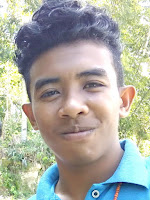 My name is Sepritus Tangaru Mahamu, usually called by my friends “Sep”. I’m a college student of East Sumba State Community Academy, an off-domicile education under Agricultural Polytechnic of Kupang state polytechnic. The farming department has two study programs, that is, livestock production and animal health. The last is the one which I study.
My name is Sepritus Tangaru Mahamu, usually called by my friends “Sep”. I’m a college student of East Sumba State Community Academy, an off-domicile education under Agricultural Polytechnic of Kupang state polytechnic. The farming department has two study programs, that is, livestock production and animal health. The last is the one which I study.
Initially, I’m like just common college students who go to their college routinely, attending classes, doing tasks, and hanging out in the campus coffee shop while doing useless stuff such as smoking and trying to flatter some college girls passing by. Until finally, at the mid of 2017, May to be precisely, I was introduced to a student assistance organization, name Stube HEMAT Sumba. Then I was invited by Jufry Adipapa to a Stube HEMAT Sumba entrepreneurship training that was held in Pambotandjara branch of GKS Umamapu on May 12-14, 2017.
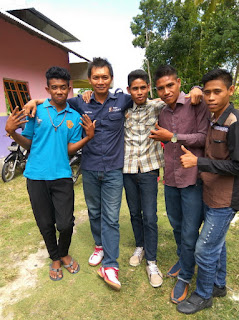 This was the point where I start to know about Stube HEMAT Sumba, an organization which has a vision to have social awareness among people, especially for college students and youths. From this activity, I quoted what Trustha Rembaka, coordinator of Stube HEMAT Yogyakarta said, “Now, it is the time to start a step to realize your ideas and be an independent youth” that encouraged me to step a head which affects what happens in Sumba then.
This was the point where I start to know about Stube HEMAT Sumba, an organization which has a vision to have social awareness among people, especially for college students and youths. From this activity, I quoted what Trustha Rembaka, coordinator of Stube HEMAT Yogyakarta said, “Now, it is the time to start a step to realize your ideas and be an independent youth” that encouraged me to step a head which affects what happens in Sumba then.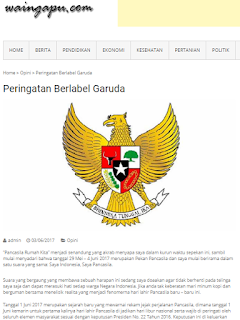 Here is where my curiosity to know more began, even I became in love with Stube HEMAT Sumba. Since then I didn’t want to miss any programs held by Stube HEMAT Sumba. One of them was the journalistic training held on June 2017. It was the first time in Indonesians’ history that people celebrated the day when Pancasila was born in accordance to President Decree No. 24, 2017. It was in a training session delivered by Oskar Shaja, the curator of Waingapu.com, I managed to create my first article entitled “Celebrations with Garuda label” which was published in Waingapu.com. My first article was very momentous for me because it also motivated me to produce more articles. It was beyond logic that there’s a strong push within me to share my knowledge that brought me to be a journalist at Suara Jarmas - a local newspaper for teenagers and youths. For the first move, I cooperated with Pandawai 1st Senior High School and made a journalistic training for senior high school in August 2017 through Ana Tana community. I personally established this community to be a place for Pandawai youths and teenagers to channel their creativity and talents.
Here is where my curiosity to know more began, even I became in love with Stube HEMAT Sumba. Since then I didn’t want to miss any programs held by Stube HEMAT Sumba. One of them was the journalistic training held on June 2017. It was the first time in Indonesians’ history that people celebrated the day when Pancasila was born in accordance to President Decree No. 24, 2017. It was in a training session delivered by Oskar Shaja, the curator of Waingapu.com, I managed to create my first article entitled “Celebrations with Garuda label” which was published in Waingapu.com. My first article was very momentous for me because it also motivated me to produce more articles. It was beyond logic that there’s a strong push within me to share my knowledge that brought me to be a journalist at Suara Jarmas - a local newspaper for teenagers and youths. For the first move, I cooperated with Pandawai 1st Senior High School and made a journalistic training for senior high school in August 2017 through Ana Tana community. I personally established this community to be a place for Pandawai youths and teenagers to channel their creativity and talents.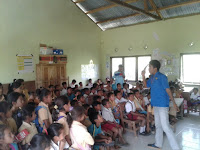 Besides that, I also had another program in Stube HEMAT Sumba, which was the most memorable for me, that is, when I was given a chance to be a blessing for my village in Laihobu, part of Paberiwai district through ‘Village and Me’ program on August 2017. There, I was literally sent to be a blessing for the village. I started the program by singing with the vocal group of Laihobu branch of GKS Kananggar, followed by playing along and sharing with toddlers and teachers. I did some activities by sharing, teaching, and at the end, I distributed stationaries to the students of Laihobu Primary School.
Besides that, I also had another program in Stube HEMAT Sumba, which was the most memorable for me, that is, when I was given a chance to be a blessing for my village in Laihobu, part of Paberiwai district through ‘Village and Me’ program on August 2017. There, I was literally sent to be a blessing for the village. I started the program by singing with the vocal group of Laihobu branch of GKS Kananggar, followed by playing along and sharing with toddlers and teachers. I did some activities by sharing, teaching, and at the end, I distributed stationaries to the students of Laihobu Primary School.“Today, you’re truly blessed through Stube HEMAT activities; therefore you need to prove the ‘impact’ as the gratitude of blessing to bless others. You need to move from your old habits, and habituate on doing the right thing, not preserving the things you’re used to doing”, said Ariani Narwastujati, the executive director of Stube HEMAT in Indonesia.
I’m so certain that because I’m blessed, therefore I’m determined to be a blessing for others. (STM).
Sumba, Its Youth and Yogyakarta
Wednesday, 29 August 2018by adminstube
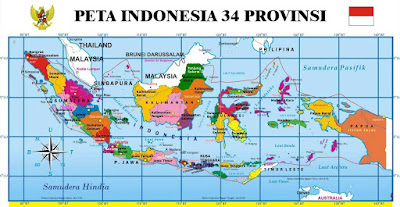 Each region has its own characteristics and potency that must be found by the residents of the region, that can be used as driving force for economy and development in the area. Of course, it should be supported by its human resource quality. If people in a potential region is unable to find, explore and develop the potencies and keep living in poverty, then the potencies will mean as a saying of chicken died in a rice barn.
Each region has its own characteristics and potency that must be found by the residents of the region, that can be used as driving force for economy and development in the area. Of course, it should be supported by its human resource quality. If people in a potential region is unable to find, explore and develop the potencies and keep living in poverty, then the potencies will mean as a saying of chicken died in a rice barn.Sumba, a small island with 11,153 km2 large has a lot of potencies, covering natural resources, native cultures, coastal tourism, beautiful hills and waterfalls, agriculture and many others. Poskupang.com reported that Sumba island has just been released as one of the 33 most beautiful islands by Focus magazine, Germany (Focus 17. February 2018, page 116). Focus Magazine, one of the leading weekly magazines in Germany, published an article with a title ‘Sumba Kein Tanz, aber ein Traum’ which means “Sumba, Not a Name of a Dance, but a Dream”, describing how beautiful the island is. In addition, the island also has the best and most expensive hotel in the world, the Nihiwatu hotel in West Sumba.
These all illustrate that Sumba is actually rich in potencies. It is a pity that the potencies are in the contrary with the reality of the people who are still poor. Based on the statistic data states 2015-2017, the average poverty rate in Sumba is still above 30%. It shows much disparity gap which is reaching 21% of the average poverty rate in Indonesia which isonly 9%. Considering this situation, it is necessary to conduct learning methods in developed areas, such as inYogyakarta. Further, Stube HEMAT Sumba sends some activists to study in Yogyakarta through exposure program to Stube HEMAT Yogyakarta.
The program of Exposure Yogyakarta is a program that aims to develop the capacity of young people from Sumba through soft-skills assistance that is expected to create independence and ability among them, so they can manage their potencies. The program is set as annual program that has been routinely carried out since 2010.
In 2018, Stube-HEMAT Sumba sent three students as participants of Exposure Yogyakarta, namely Jufri Adi Papa, a student of Wirawacana Christian University and a member of Stube HEMAT Sumba team, who will learn secretarial and integrated farming;Sepritus Tangaru Mahamu, a student of Kupang State Politani PDD of East Sumba, who will learn journalism and animal husbandry; and Meliani Retang, STT GKS Lewa student, who will learn more about local food processing and integrated farming. Approximately 1 month in Yogyakarta, they will learn and practice through every activity they are involved in, starting from August 24 to September 20, 2018.
Have a good process in Yogyakarta! (JUF).
Before Leaving Sumba
Monday, 27 August 2018by adminstube
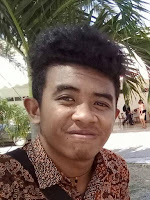 Leaving Sumba for the first time and being abroad for almost a full month isn’t an easy thing, especially for families that will let their child go. That is also what I’m able to perceive through my mother’s glare, a little panic when I said that I’m going to Java. Usually, I only said to my mother that I’m going to my friend’s place in the nearby district. After understanding my departure, my mother reminds me to do a ritual for those who want to leave Sumba for the first time. I have to ask for permission and approval from my deceased father. This ritual is named Wangu Uhu Mameti (feeding the spirit) and Wuangu Pahappa (giving Paan to the spirit) and also, Parmihi la Mameti (asking permission and protection from the spirit) which then I actualized in my prayer by lighting a candle on my father’s gravestone. It is the Marapu culture we have in Sumba and that’s also what my mother meant even when we’re already Christians, Marapu customs is stil within our life.
Leaving Sumba for the first time and being abroad for almost a full month isn’t an easy thing, especially for families that will let their child go. That is also what I’m able to perceive through my mother’s glare, a little panic when I said that I’m going to Java. Usually, I only said to my mother that I’m going to my friend’s place in the nearby district. After understanding my departure, my mother reminds me to do a ritual for those who want to leave Sumba for the first time. I have to ask for permission and approval from my deceased father. This ritual is named Wangu Uhu Mameti (feeding the spirit) and Wuangu Pahappa (giving Paan to the spirit) and also, Parmihi la Mameti (asking permission and protection from the spirit) which then I actualized in my prayer by lighting a candle on my father’s gravestone. It is the Marapu culture we have in Sumba and that’s also what my mother meant even when we’re already Christians, Marapu customs is stil within our life.Marapu, the traditional belief of Sumba people, believes that God takes shape of Mabakulu Wuamata Mabalaru Rukahilu (having big eyes and wide ears) meaning He hears all and sees all. Marapu believes that every deceased person can communicate with, listen, and protect their beloved ones. Due to the change of times, this belief has been eroded, where nowadays the majority of Sumba people have embraced their own religion. However, Marapu is still preserved and believed by the majority of Sumba people, especially after the Indonesian government recognized the existence of local religions, including Marapu.
After doing this ritual, I said my last goodbye and continued my activity to follow a briefing at 23rd of August in Stube-HEMAT Sumba secretariat with Sumba team. This Yogyakarta exposure program is an annual Stube-HEMAT Sumba program which will send its activists to study at Stube-HEMAT Yogyakarta and it is very exciting being a participant of Yogyakarta exposure program, because it is a rare chance and also a great blessing. Exposure Yogyakarta 2018 program is the nine series of Stube-HEMAT Sumba program that has mandated Jufri Adipapa to learn administration and agriculture, Meliani Retang to learn agriculture and local food products, and Sepritus Tangaru Mahamu who will learn journalism and animal husbandry.
Yogyakarta exposure participants will learn for about 28 days in Yogyakarta, from 24th of August to the 20th of September 2018. Certainly, it’s not something short, you need to be well-prepared and have permission from your parents, especially for those who will leave Sumba for the first time. After an overnight stay at Stube-HEMAT Sumba secretariat, I and my friends departed to Yogya in the next morning. Now it’s time to learn in Yogya in order to return with a full shelf of knowledge useful for me and others. (STM)
Be Smart with Your Houseyards Students' actions of Waingapu nursing academy
Monday, 23 July 2018by adminstube
Never let your house yards bare. Why? Yes, it can be used in many ways, such as garden for healthy plants, family based medical plants, supply vegetables needs, fruits and so on. Some students of Waingapu nursing academy, especially those who live in campus' dormitory, are enthusiastic to cultivatevegetables. They are Apronia Dai Duka, Novita, Dewi, Rambu Ira and Delvi who initiated to cultivate bare lands in front of their dormitory by planting vegetables and medical plants.
Why did this happen? It started from their participation inthe training of Organic Farming held by Stube-HEMAT Sumba in Lambanapu, Kambera, a few days before. The experience they got from the training opened their eyes toward the bare lands in their dormitory and brought an idea to optimize it to be a vegetables garden. At the end of the training they proposed their ideas and it became one of the follow-up activities done by participants of the training.
"You have to practice what you have got from the training, so your knowledge will be useful for others while it also reducesyour daily expenses", said Melkisedek Landi, S.Kep.Ns, M.Med.Ed, a lecturer who gave appreciation and encouragement to the students.
Soon, they started to distribute jobs to cultivate the soil, making fence to keep away from animals and providing seeds. It began in the beginning of July 2018. "Thank to the lord, today is the second time for us to sow seeds. The first seeds havealready grown. We planted spinach, long beans, green mustards.We hope our vegetables harvest can fulfill our daily needs for cooking, rather than buying vegetable in a market, we can save our money”, said Apronia Dai Duka, one of the students who live in the dormitory.
The garden actually gave them good harvests, even though some seeds were died because of the drought. They believe when they cultivate the soil, plant seeds and maintain the seeds, the plants will grow better and give good harvests.
So, since now, never let the lands bare and wasted. Let us cultivate the lands, plant seeds and maintain them carefully so they will yield the benefits. (ADK).
Students Serve Their Villages: Yes, We Can! (1) Participants’ experiences of Village and Me program
Monday, 2 July 2018by adminstube
Generally when speaking about village, people will imagine such a region that has not developed and has limitations. Indonesia has 83.931 administrative areas at village level consisting of 75.436 sub districts, 8.444 villages and 51 UPT/SPT (BPS data 2018). This large number make villages need attention to be developed and be independent. If there isnothing to do with those villages, the villagers tends to move to city and the villages will be left behind.
It is a starting point for Stube-HEMAT Sumba to encourage students to pay attention to villages where they come from by sharing their knowledge gained during their lectures in town/city. It is manifested in Village and Me program, which give them chance to carry out activities that are useful for residents in their home villages during semester break. The participants of the first group in 2018 were displayed here to share their experiences. Who are they?
Naser Randa Hailu Poti, a student of Wirawacana Sumba University majoring Biology Education. During his semester break he carried out empowerment activities and gave motivation to elementary and early education group (PAUD) inhis village, Rakawatu, Lewa. The activities done were drawing, coloring and reading competitions, as well as commemorating Indonesian independence. He also shared knowledge how to make‘bokashi’ fertilizer and cattle nutrition. This nutrient is made from banana flower bud and liquid sugar. Those ingredients are easily obtained, so farmers have no difficulties in making cattle nutrition.
He also gave his time to serve Sunday school children at GKS Rakawatu, a local church at Lewa, East Sumba. He thought thatchurch attention and service to the congregations is not onlyfor adults but also children as the next generation. The church administrator responded positively to Naser’s initiative, by providing meeting room and gathering the church members.
Melkianus Ngahu Moy, a student of Theological Institute (STT)Terpadu. He is from Kawangu, East Sumba. During his semester break he was in his village for service activities at GKS Kawangu. The activities he did there were be a companion in Bible Study for adults, church youth fellowship and Sunday school teachers. Melki, his nickname, realized that the church service to the congregation cannot depend only on the pastor but in other way, young people should take part in it. Heseemed confident to serve the local church congregation because his activities were matched with theological study background that he learned.
Deriatus Awa, spent his semester break by returning back to his village, but he did not come 'empty' but brought 'blessings' to his village in Tanggamadita, East Sumba. As a student of Theological Institute (STT) GKS majoring in Theology, he gave his time to serve and assist children to learn in PAUD ‘Nazareth’. He helped them creatively with teaching aids, coloring and providing school supplies. He also introduced them how to have cleanliness by washing their hands after class and how to love environment by planting trees atthe school yard. Even, he repainted the classrooms with new colors so that they felt more comfortable to study. Now they looked more enthusiastic to come to school and the number of children increases.
When a student gives his/her knowledge got from campus to community, actually he/she has touched three aspects of self-development at once, that is, sharpening skills to apply the knowledge he/she has learned, strengthening psychological bonds with his/her village, and having involvement in villagedevelopment. So, students, please think and take opportunity to act as well as possible for your villages. (TRU).
Rethinking Organic Farming in Sumba
Tuesday, 12 June 2018by adminstube
Organic farming is nature harmony agriculture having balanced relationship between human and nature, that people maintainthe natural habits and use natural methods in processing agricultural land so that the environment remains sustainable and the ecosystem balance continues to be maintained.
 In the southern part of Indonesia which stretches as tropical savannah with an area of 7.000,5 km2, that is the island of Sumba. The mainland of Sumba is a living place for Sumbanese and various other tribes with diverse cultural and religious backgrounds as well as agricultural and livestocks as a support for the economic of the region. Sumba island consists of four districts, namely East Sumba, Central Sumba, West Sumba and Southwest Sumba, with their own uniqueness, for example East Sumba has a vast agricultural area that can be cultivated by its inhabitants to produce food in a natural way without using chemicals. Basically, farming in Sumba is still natural because it depends on the season, which the dry season is longer than rainy, so agricultural processing is only done when the rainy season approaching. When the dry season the agriculture land becomes grazing field for livestocks. Agricultural land rests and even gets fertilizer from animal waste which increases soil nutrients.
In the southern part of Indonesia which stretches as tropical savannah with an area of 7.000,5 km2, that is the island of Sumba. The mainland of Sumba is a living place for Sumbanese and various other tribes with diverse cultural and religious backgrounds as well as agricultural and livestocks as a support for the economic of the region. Sumba island consists of four districts, namely East Sumba, Central Sumba, West Sumba and Southwest Sumba, with their own uniqueness, for example East Sumba has a vast agricultural area that can be cultivated by its inhabitants to produce food in a natural way without using chemicals. Basically, farming in Sumba is still natural because it depends on the season, which the dry season is longer than rainy, so agricultural processing is only done when the rainy season approaching. When the dry season the agriculture land becomes grazing field for livestocks. Agricultural land rests and even gets fertilizer from animal waste which increases soil nutrients.
How is the opportunities for organic farming in Sumba?
The area of agricultural land in East Sumba is around 8.358.00 Ha, based on the data of National Statistical Institute (BPS)2014. It shows that the opportunity for organic farming in East Sumba can be the modal for competing in local and national markets. The commodities for local markets arevegetables, tubers, and nuts. While commodities for national markets are cashews, cotton, areca nut, coffee and chocolate.Unluckily the agriculture products are sold as raw material, not processed into derivative products yet. It impacts on low income and lackness of innovation capability of farmers. The existence of traditional farmers who farm naturally should be maintained and even assisted with knowledge and skills of utilizing local materials as organic fertilizers and pesticides to improve the quality of crops and harvests. This is the duty of every stakeholders who competent in agriculture to carry out these tasks, although in general it is all Sumbanese’s responsibility.
How is the interest of Sumba young people in agriculture?
 The influence of modernization has reached Sumba including its youth. Most of them are not longer interested to be farmers. They prefer to work as civil servants or company employees because they are considered more elite. There is an assumption that becoming farmer can reduce prestige and desire to earn money without waiting or processing such as farming from cultivating land, caring for crops until harvesting time. This is not entirely wrong because agriculture is considered not prospective. It needs efforts to raise awareness and view of young people on agriculture by showing the prospects of agriculture, as experienced by Frans Fredi and Aloysius, two young Sumba youth who dare to start organic farming in Lambanapu area, East Sumba. Hopefully the actions of these two young people can awaken the movement of young people to love organic farming in Sumba.
The influence of modernization has reached Sumba including its youth. Most of them are not longer interested to be farmers. They prefer to work as civil servants or company employees because they are considered more elite. There is an assumption that becoming farmer can reduce prestige and desire to earn money without waiting or processing such as farming from cultivating land, caring for crops until harvesting time. This is not entirely wrong because agriculture is considered not prospective. It needs efforts to raise awareness and view of young people on agriculture by showing the prospects of agriculture, as experienced by Frans Fredi and Aloysius, two young Sumba youth who dare to start organic farming in Lambanapu area, East Sumba. Hopefully the actions of these two young people can awaken the movement of young people to love organic farming in Sumba.
It should be admitted that the application of organic farming require synergy from local governments as policy makers, agricultural agency as arm of government that accompany farmers, community organizations as counterweight and farmers who cultivate the land. In the future, an optimistic attitude, willingness to learn and common goals need to be possessed, so organic farming in East Sumba will develop and compete in the national market. Hopefully. (Yanto Umbu Muri).
Finding the Charm of Black Sands Beach
Monday, 11 June 2018by adminstube
 Have you ever heard the name of Black Sands beach? Some people will frown their forehead when they are asked? Yet having visited, even never heard about it, as many people have less information about it. Black Sands Beach is a beach with black sands, located in Middle Sumba, precisely at Mananga village, Mamboro district.
Have you ever heard the name of Black Sands beach? Some people will frown their forehead when they are asked? Yet having visited, even never heard about it, as many people have less information about it. Black Sands Beach is a beach with black sands, located in Middle Sumba, precisely at Mananga village, Mamboro district.The Black Sands beach is still underestimated not only by the government but also the people due to the belief that the beach is not widely known and the black sand itself is not considered as beneficial thing to be promoted. However, many tourists with special interests came to see the beach with unique black sands.
Despite its name, there is no clear historical record about the place, however, this black sand is believed as a heritage from the ancestors and described as a hidden black pearl. The black sand itself is unique, in addition to its blackness, the sand is glossy. When it’s combined with the coral cliffs and the exotic coral caves, it completes the savanna that drapes the path to the beach.
Majority of the people who live near the beach believe in Islam due to their origins which is not from Sumba, and to make a living they work as fishermen. This location had a substantial fish deposits so it’s rare seeing fishermen come back with empty basket, this makes people flocks to the location to purchase sea products, apart from the beach.
The 140-kilometer trip from Waingapu to Black Sands Beach takes up three to four hours to reach Waibakul in Middle Sumba, then turning right to Mamboro’s harbor. Unluckily, there is no public transport available to bring you there. Therefore, you’ll be better to rent a car or a motorcycle.
Black Sands Beach can be an alternative destination for the tourists in Sumba in which they can find many things, such as the uniqueness of the black sand, relieving their wear and tire from working routine, enjoying the tree-capped coral cliffs, seeing the vast savanna, and buying fishermen’s recently caught fishes. But it needs to be aware, that there are not many facilities on the beach, therefore tourists who want to experience the beach needs to bring their own meal. (Jekson H. Tana)
Giving Impact through Writing
Saturday, 9 June 2018by adminstube
Writing is important because by writing someone can practice hobby, express feelings and even influence others. One needs to practice his/her writing skills because writing is a combination of knowledge and art. So, more often someone writes, more eloquent and skillful to string words into writing.
Writing skills need to be owned by students, so Stube-HEMAT Sumba as a student mentoring institution facilitated them with Journalistic training. The training in Waingapu took place at the secretariat of Stube-HEMAT Sumba since Wednesday, May 16, 2018. Yanto Hangga, one of Stube-HEMAT Sumba team opened a series of trainings by giving an introduction of participants,explaining the program and objectives of the event. He also introduced Trustha Rembaka, S.Th, coordinator Stube-HEMAT Yogyakarta, who facilitated training to equip students to know and apply writing skills.
Sixteen participants attended the training and they came from various campuses in East Sumba including the Nursing academy of Waingapu, Wirawacana Christian University, AKN and several community activists such as Ana Humba Community and Ana Tana Community.
In introduction session, Trustha invited participants to share their own sub-district and the potencies. However there weresome participants who had difficulty explaining the village and its potencies. Actually self-recognition is the starting point for ?someone to start writing by revealing the plus and minus of their origin. Then, through writing, someone will be known even after he/she passed away because writing remains eternal. We are the persons who are in Sumba able to know Indonesian and world leaders because of writings. We may agree with them because their thoughts for the nation and humanity are manifested in their writings.
The first step of writing is to recognize the types of writing, such as Reportage, a writing that cover of events in the field according to the facts; Opinion, a type of writing in the form of opinions, ideas in response to a problem, in which the author analyzes the problem and provides alternative solution; Feature, a short, informative and inspiring writings which discusses characters, tourist attractions and culture; and Poetry, a writing of feelings and sometimes symbolic expressions that is bonded to certain rules such as number of lines, number of syllables and vocals. Further, the participants determined the topic of writing in accordance with their interests and created framework of writings that they would made.
The next meeting was a small class which facilitated participants to discuss with the facilitator. This method wastaken in order that the process of writing mentoring workedmore effectively and participants were free to discuss their writings. Only eight of sixteen participants followed this consultation meeting. It should be admitted that writing wasnot easy, but some participants were eager to complete their writings.
"I was so inspired by this meeting, actually, writing was beneficial for me even though it is difficult at the beginning. I can share information, even it can be published in printed media someday, however, the most important thing is that I am passionate about learning journalism itself”, said Yanto Umbu Muri, a student of Wirawacana Christian University.
To be a young writer who has some impacts must be inititatedsince now, so, start writing right now. (Sarimita Andani Ata’ambu).
Note: Journalism Class also took place at Lewa facilitating students of Theological Institute of Sumba Christian Church. There were seven students of theology and Christian education study program attending the class. They were from Mamboro, Kodi, Lewa, Waikabubak and Waingapu. They learned similar topic as journalistic classes in Waingapu.
Titus Wanda: The Guardian of Sumbanese Art and Tradition
Thursday, 7 June 2018by adminstube
"Limalangu, limalangu", said a middle-aged man while he stepped out of his house welcoming us at Waimiripu Tana Mbokar art studio, Kalumbang, East Sumba. He is Titus Wanda, a figure and art practitioner, born in June 19, 1947. The word 'limalangu' itself has a meaning of peaceful in the heart, a welcome greeting bringing sense of peace in the heart.
The name of Titus Wanda is familiar among local people because of his passion and love for Sumbanese cultural arts, as he devotes his life to preserve cultural arts of Sumba throughhis an art studio called ‘Waimiripu Tana Mbokar’, which meansliving water of sustainable soil, that can be translated as preserving the original dances of Sumba so they will besustainable.
He acknowledged that time is unavoidable either for Sumba and its youth generation. They are attracted to something modern, and unfortunately forget their own cultures because no one introduces cultures to them. Moreover, the practitioners of Sumbanese art and tradition are old, and without efforts to inherit it, they will be lost. He initiated action to establish an art studio to preserve Sumbanese dances and local languages that were almost extinct and to prevent negative influences from other cultures, to increase and direct Sumba art activities, especially original Sumbanese culture, such as dances, songs, woven fabrics and cultural arts instruments.
For this reason, in August 17, 2004, ‘Waimiripu Tana Mbokar’art studio was officially founded. Located in Kalumbang, East Sumba. The affirmation of the existence of the studio is getting stronger after obtaining a notary certificate in July 15, 2015 when he registered it to Tourism Office of East Sumba regency as a way to show the existence of ‘Waimiripu Tana Mbokar’. The organizers are Titus Wanda, Afliani, Christofel Njurumana (head of sub-district), Dominggus (head of sub-district) and Didimus J. Dewa (retired civil official).
The activities are held twice a week in Kalumbang. The dancers are children from elementary school to high school and grouped into six female and four male dancers, two drummers, four ‘kakalak’ and four gongs. The age range is around 5-10 years old for children and 11-20 year old for adult dancers. The frequent performed dance is ‘Ninggu Harama’ (a war dance), two female dancers holding machete and two male dancers holding shields and spears for self-defense. There are also entertainment dances such as ‘Kabokang’ and ‘Kandingang’ performed by four male dancers and six female dancers. The art studio has performed dancers for several times at provincial events, national independence day anniversaries, welcoming guests, thanksgiving, church anniversaries, and weddings. The income fund from the stage invitation is distributed evenly to the members.
Titus Wanda who was a facilitator in Stube-HEMAT Sumba training on Tourism also explained the meaning of symbols in Sumbanese woven fabrics, such as horses (ndjara) symbolize welfare or strength, rooster (manu) symbolizes leadership and heroism, parrots symbolize forum deliberance, human symbolizesadmiration, skulls (andung) symbolize death for securitydefense, deer symbolize pride or arrogance, while shrimp symbolizes resurrection behind death.
"This is what I can do to preserve cultural arts of Sumba and I am working for people, church and Sumbanese custom. We pray for each of us peace in our hearts, limalangu", said Titus Wanda who is also actively involved in ministry in Christian Church of Sumba at Payeti congregation, Waingapu.
Yes, it must be acknowledged that the preservation of arts and cultures in such a region, especially Sumba, return back to the awareness and commitment of the present generation to keep and preserve them. Hopefully. (Valentino).
Man & Woman, Equal?
Thursday, 7 June 2018by adminstube
We can find a lot of cases of violence towards women in Indonesia. The numbers of the cases which aren't subliminal require an in-depth attention from all those in charge. Gender inequality happens in many aspects, to name a few, in the term of expressing own opinion and participating in mass organizations and public service. This issue has become the responsibility of many parties to unite against gender equality.
Currently, Indonesian society, especially women are fighting intensely for their rights, for gender equality. Many actions have been done, doing demonstrations, performing art show, and writing articles about women. This term is widely known as gender equality, which means a fair and balanced treatment and roles between men and women in the society. Gender equality is still not fully materialized in Indonesia due to factors such as the lack of knowledge about gender equality, society's assumption that women are weak, patriarchy's strong grip, and low numbers of women participation in public sectors.
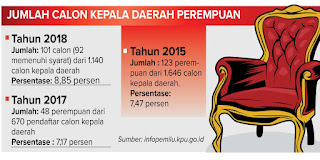 Concrete evidence for this can be found in politics where patriarchy still has a tight grip. According to PERLUDEM (Association for General Election and Democracy) in 2017, simultaneous regional election showed that women participation only counts for 7, 17% of the total 614 candidates for regional leaders at the entirety of Indonesia (perludem.org). Actually women with great potential for the nation and country are not scarce, we can see this through the role of women teachers that ‘gave birth' to influential persons.
Concrete evidence for this can be found in politics where patriarchy still has a tight grip. According to PERLUDEM (Association for General Election and Democracy) in 2017, simultaneous regional election showed that women participation only counts for 7, 17% of the total 614 candidates for regional leaders at the entirety of Indonesia (perludem.org). Actually women with great potential for the nation and country are not scarce, we can see this through the role of women teachers that ‘gave birth' to influential persons. In Sumba, one of the islands in East Nusa Tenggara, we can find many cases of gender inequality. Ranging from the opportunity to study in university to decision making, we can find man has much more opportunities and is regarded as more capable compared to women. Therefore, the fight for gender equality still has a long way to go and requires multiple parties to involve in the conquest for gender equality.
In Sumba, one of the islands in East Nusa Tenggara, we can find many cases of gender inequality. Ranging from the opportunity to study in university to decision making, we can find man has much more opportunities and is regarded as more capable compared to women. Therefore, the fight for gender equality still has a long way to go and requires multiple parties to involve in the conquest for gender equality. Church's Role, churches are critical parts on the conquest of gender equality. Preachers can influence their congregation on the importance of women's role in decision making, doing services and activities that give benefits both the church and the society.
Church's Role, churches are critical parts on the conquest of gender equality. Preachers can influence their congregation on the importance of women's role in decision making, doing services and activities that give benefits both the church and the society. Government's Role, as a policy maker, government needs to give attention and have a good will towards women, starting from discussions among the populace with the topic of women empowerment, and educating people about the misunderstanding that men are considered superior beings in patriarchy system. Furthermore, the government needs to eliminate the stigma amongst the populace that women are inferior beings and ‘kitchen occupant'.
Government's Role, as a policy maker, government needs to give attention and have a good will towards women, starting from discussions among the populace with the topic of women empowerment, and educating people about the misunderstanding that men are considered superior beings in patriarchy system. Furthermore, the government needs to eliminate the stigma amongst the populace that women are inferior beings and ‘kitchen occupant'. Family's Role is not less important, that’s why family is required to teach their children in the term of gender equality, as actions of the populace is a reflection of what happens inside the family.
Family's Role is not less important, that’s why family is required to teach their children in the term of gender equality, as actions of the populace is a reflection of what happens inside the family.As a conclusion, if you care about yourself, your mother and your woman, and all women, let's join the struggle to realize gender equality, not only in Sumba but also in our country. (Antonia Maria Oy).
Kampong Tambera: As If Delving Into The Past
Wednesday, 6 June 2018by adminstube
A long-buried desire finally came true when I visited kampong Tambera in Doka Kaka village, Loli sub-district, Western Sumba regency when I was attending Wai Humba VI festivity in 2017. Wai Humba itself is a festival aiming to increase the relation between man and God which is manifested in preserving the nature and environment. The festivity at that time uses the theme of “We are not human marching to extinction”.
To reach kampong Tambera from Eastern Sumba’s district capital, Waingapu requires approximately three hours travel by motorcycle. However, vehicles are unable to reach the kampong due to the existence of a 20-steps staircase to get from the village administration center to the kampong’s field. Therefore, from the village administration center, I needed to go uphill on foot due to the location of the kampong itself which is built on the top of a hill and surrounded by thick groves.
Due to the feature and contour, stony and not plain, the kampong’s field is terraced. The custom houses were built terraced on the edge of the field from the entry gate until the rear end of the kampong. The beams and floorings of the houses mostly made from forest logs. In the centre of the field, there are stone tombs with various length and shapes, from round to oval and square.
With the mild air, surrounded by trees, and also the hospitality of the commoners reflected a serene and peaceful living, this kampong is different from others. Visitors of this kampong is expected to keep their manner in order, including I that also need to control mouth by not insulting the rato (kampong’s chief) due to the tradition in this kampong which is still well-maintained.
This kampong is an Ina-Ama (Mother-Father) kampong or the main spiritual site of the Loli tribe. This kampong is also the home of Wulla Poddu ritual, a sacred ritual of the disciples of Marapu, a traditional belief of ethnic Sumba people. This ritual is held a whole month.
Other uniqueness that I found in this kampong is the residents cannot use synthetic flavorings for cooking. The only flavoring they are allowed to use is basil leaves and other natural ingredients, even salt is forbidden. However, with those restrictions, the food they made still tastes good. Next, it doesn’t mean that all kampong Tambera residents don’t use salt for cooking, because most of the kampong Tambera residents don’t reside there permanently, as only certain persons are allowed to take permanent resident in this kampong.
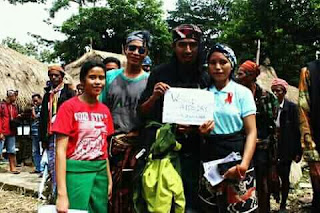 I’m grateful to be able to visit kampong Tambera and I’m fascinated with the existence of old but well-maintained housings. Here in the kampong, I learned how to struggle to achieve a goal, unite with nature, and also appreciated how the culture and tradition which existed hundreds of years ago are still practiced in the current time. (Apronia Dai Duka)
I’m grateful to be able to visit kampong Tambera and I’m fascinated with the existence of old but well-maintained housings. Here in the kampong, I learned how to struggle to achieve a goal, unite with nature, and also appreciated how the culture and tradition which existed hundreds of years ago are still practiced in the current time. (Apronia Dai Duka)Wednesday, 6 June 2018
by adminstube
 The real situation above is one of the social problems as well as business opportunities in the field of horticultural agriculture. Some young people who are still students majoring in economics and also members of Stube-HEMAT Sumba, see a potency for business opportunity in such situation. Therefore, they formed a Young Farmers Community who decided to become a business actor in agriculture. The strategy in developing agriculture is by establishing a center of agricultural production. The goal is to maximize natural resources and educate public that a village or a place can be recognized with its superior products.
The real situation above is one of the social problems as well as business opportunities in the field of horticultural agriculture. Some young people who are still students majoring in economics and also members of Stube-HEMAT Sumba, see a potency for business opportunity in such situation. Therefore, they formed a Young Farmers Community who decided to become a business actor in agriculture. The strategy in developing agriculture is by establishing a center of agricultural production. The goal is to maximize natural resources and educate public that a village or a place can be recognized with its superior products.
 Currently Fredi and Aloysius are building Horticulture business and developing some 4000 seedlings of chili, 1,000 seedlings of watermelon and some other plants such as melon, cabbage, papaya, purple eggplant and pariah in Lambanapu. While at the same time, Hendrikus Hina Lunggu Manu and Francis K. Halang developed a hybrid corn business in a 2 Ha field in Kadumbul.
Currently Fredi and Aloysius are building Horticulture business and developing some 4000 seedlings of chili, 1,000 seedlings of watermelon and some other plants such as melon, cabbage, papaya, purple eggplant and pariah in Lambanapu. While at the same time, Hendrikus Hina Lunggu Manu and Francis K. Halang developed a hybrid corn business in a 2 Ha field in Kadumbul.
 This community business development is not only focused on the members but also coaching for young people so they can grow as young business actors and can meet the needs of everyday life. (Frans Fredi Kalikit Bara)
This community business development is not only focused on the members but also coaching for young people so they can grow as young business actors and can meet the needs of everyday life. (Frans Fredi Kalikit Bara)
by adminstube
Young People
Falling in Love
With Agriculture
East Sumba Regency is one of the districts in East Nusa Tenggara that is rich of natural resources. One of them is agriculture. Wetland area in East Sumba regency is about 15,601 Ha and dry land area 547,701 Ha (BPS Kabupaten Sumba Timur, 2016: 193-197). Astronomically the district of Sumba Timur is between 119 ° 45-120 ° 52 East Longitude (BT) and 9 ° 16-10 ° 20 South Latitude (LS). Geographically, East Sumba regency has northern boundaries with the Sumba Strait, south to the Indian Ocean, east to Sabu Sea, west to Central Sumba Regency (BPS of East Sumba District, 2016: 3).
The market demand of Waingapu is instable, sometimes it is overproduction, other wise, there is a stock shortage. Actually, there are several horticulture centres that support Waingapu market that is Marada Mundi, Kiritana village, Lambanapu, Mauliru, Maulumbi, Mauhau and Kawangu villages. Several areas above can produce agriculture in the dry season, but others cannot produce because they are on the river bank(Marada Mundi village, Kiritana village) and some other areas have no agriculture innovation in the rainy season.
 The real situation above is one of the social problems as well as business opportunities in the field of horticultural agriculture. Some young people who are still students majoring in economics and also members of Stube-HEMAT Sumba, see a potency for business opportunity in such situation. Therefore, they formed a Young Farmers Community who decided to become a business actor in agriculture. The strategy in developing agriculture is by establishing a center of agricultural production. The goal is to maximize natural resources and educate public that a village or a place can be recognized with its superior products.
The real situation above is one of the social problems as well as business opportunities in the field of horticultural agriculture. Some young people who are still students majoring in economics and also members of Stube-HEMAT Sumba, see a potency for business opportunity in such situation. Therefore, they formed a Young Farmers Community who decided to become a business actor in agriculture. The strategy in developing agriculture is by establishing a center of agricultural production. The goal is to maximize natural resources and educate public that a village or a place can be recognized with its superior products.
The Young Farmers Community has a network with Red Arrow, a provider of quality and reliable seed for the community. Young Farmers Community has members, namely Frans Fredi Kalikit Bara, Aloysius Umbu Sili Ndingu, Hendrikus Hina Lunggu Manu and Francis K. Halang. The strategy is to use social media such as Facebook, Whatsapp, business identity card and direct approach with buyers in the market and in food stalls. This community is optimistic in agricultural production center-based production. One important reason why cultivating this field, because agriculture is a food necessity or basic need and consumers definitely need food every time. Agricultural business is one big business if it is seriously done by utilizing technology and agricultural innovation. In addition, market demand for food will never stop.
 Currently Fredi and Aloysius are building Horticulture business and developing some 4000 seedlings of chili, 1,000 seedlings of watermelon and some other plants such as melon, cabbage, papaya, purple eggplant and pariah in Lambanapu. While at the same time, Hendrikus Hina Lunggu Manu and Francis K. Halang developed a hybrid corn business in a 2 Ha field in Kadumbul.
Currently Fredi and Aloysius are building Horticulture business and developing some 4000 seedlings of chili, 1,000 seedlings of watermelon and some other plants such as melon, cabbage, papaya, purple eggplant and pariah in Lambanapu. While at the same time, Hendrikus Hina Lunggu Manu and Francis K. Halang developed a hybrid corn business in a 2 Ha field in Kadumbul. This community business development is not only focused on the members but also coaching for young people so they can grow as young business actors and can meet the needs of everyday life. (Frans Fredi Kalikit Bara)
This community business development is not only focused on the members but also coaching for young people so they can grow as young business actors and can meet the needs of everyday life. (Frans Fredi Kalikit Bara)Sumba: Towards an Organic Farming Island
Tuesday, 15 May 2018by adminstube
Farming is the most basic source of income because the most basic need of society came from plantations, fields, and farms. Harvests can be used to fulfill one’s need for food, or it can be sold to fulfill other needs. A healthy society can be achieved if they consumed organic foods, which means that the food should be free from preservatives or other chemical substances. However, over the course of time, society nowadays prefers instant or fast food, regardless of nutrients within it and also assumes that organic food has an awful taste on the tongue.
Such lifestyle is not only affecting the society’s dietary habits but also affecting the overall health of the society. This particular situation became an entrance point for Stube-HEMAT Sumba to have an organic farming training for Sumba’s youth. More than 30 participants from college students and youth from various communities in Waingapu and its vicinity participated in this training. The training with the theme “The added value of organic farming for human and environment” is held at the hall of GKS Lambanapu, Kambera from Friday 11 to Sunday 13 of May 2018, inviting four persons from practitioners and local government officials as speakers on the training.
 The Association of Pests Controlling Farmer (IPPHTI) of Sumba district brought two speakers for this training; they’re Fajrin Rizky and Markus Dendu Ngara. Both of them are farmers, researchers, also mentors for farmers in Sumba district. They presented materials about the ecosystem, mineral content test, and manufacture of organic nutrients for livestock, and healthy rice seed selection. “Ecosystem study knowhow is critical for beginners who want to learn further organic farming because there is a process of awareness about the nature itself obtained by participants”, reveal Markus Dendu Ngara
The Association of Pests Controlling Farmer (IPPHTI) of Sumba district brought two speakers for this training; they’re Fajrin Rizky and Markus Dendu Ngara. Both of them are farmers, researchers, also mentors for farmers in Sumba district. They presented materials about the ecosystem, mineral content test, and manufacture of organic nutrients for livestock, and healthy rice seed selection. “Ecosystem study knowhow is critical for beginners who want to learn further organic farming because there is a process of awareness about the nature itself obtained by participants”, reveal Markus Dendu Ngara
 In addition to learn all above, participants also learned the strategy how to market their organic harvest. This particular topic is presented by Umbu Maramba, a lecturer on Agribusiness at the Christian University of Wirawacana in Sumba, followed by Ir.
In addition to learn all above, participants also learned the strategy how to market their organic harvest. This particular topic is presented by Umbu Maramba, a lecturer on Agribusiness at the Christian University of Wirawacana in Sumba, followed by Ir. Rudiolof Boling who came as the representative of Eastern Sumba’s Department of Agriculture. He revealed Eastern Sumba government’s reaction toward organic farming in Sumba.
Rudiolof Boling who came as the representative of Eastern Sumba’s Department of Agriculture. He revealed Eastern Sumba government’s reaction toward organic farming in Sumba.Participants of this training eagerly asked many questions, suggestions, and opinions, one of which was a hope that the government gives more attention to the farming condition in Sumba. Furthermore, participants also got opportunity to practice how to manufacture organic nutrients for livestock.
 “College student shouldn’t only speak about how they’re agents of change, but rather to act as one”, said Jufri Adipapa, one of the Stube-HEMAT Sumba’s team member while accompanying the participants creating a follow-up plan. Participants divided themselves to several groups to perform follow-up on this training, such as practicing the manufacture of organic nutrients for livestock, sharing the knowledge that they obtained to their community, and making use of their campus dormitories yard as a vegetable garden for college students.
“College student shouldn’t only speak about how they’re agents of change, but rather to act as one”, said Jufri Adipapa, one of the Stube-HEMAT Sumba’s team member while accompanying the participants creating a follow-up plan. Participants divided themselves to several groups to perform follow-up on this training, such as practicing the manufacture of organic nutrients for livestock, sharing the knowledge that they obtained to their community, and making use of their campus dormitories yard as a vegetable garden for college students.
Sumba’s growth and development must bring a good impact to Sumba, that means maintaining the farming industries and hindering the entrance of negative lifestyle to their society. As Sumba’s youth, we must be a youth that becomes an agent of change in order to bring good fortunes to our region. (Apronia Dai Duka).
Students and Charity of Love
Monday, 16 April 2018by adminstube
"There is no resurrection without death. Give thanks to the Lord Jesus who gave his life to die on the cross and replaced the man that should be wrathed by God. Thanks to God because on the third day, Jesus rose and came back to life! The Lord Jesus really wins over death. Otherwise, it is useless to believe in Him. This is the Christian faith. Through death and resurrection of Christ, we are justified and saved from sin and have eternal life. It is a message to reflect the proven sacrifice and love of Christ, and the Easter moment comes to renew life."
This became the reflection of Lewa Student Association (IKPML) Waingapu and Stube-HEMAT Sumba during social action as charity service in Christian Church of Sumba (GKS) Jemaat Kapunduk, Praimarada branch, in Matawai Padangi village, Haharu, on Saturday-Sunday, April 14-15, 2018.
In this activity they provided donations such as used clothes, bath soap, laundry soap, shampoo and construction materials, such as cement, concrete and wire. This service is devoted for orphans and widows and other impoverished families. On the spare time of the services, participants held discussion with community on social issues that exist within the community itself, such as food and water shortages. These two things became main obstacles for the people in this village. They must walk 7-10 km and down the hill to get water for drinking and cooking.
Opang Maramba Djara, the head of IKPML Waingapu in his speech said, "This activity is our awareness as student to share love with others in need. We hope the charity and donation for church building we give to the congregation here may be a blessing and extend the glory of the Lord."
Jufri Adipapa, one of Stube-HEMAT Sumba working team expressed his restlessness to witness the condition of church that is less comfortable and apprehensive but also proud to the people here who have strong spirit of mutual cooperation so that the church building processescan be continued until it is completely built and used for worship, listening to the truth of God's Word comfortably.
Matayewa Anakotak, local church gospel teacher thanked for the visit, charity and development contributions for the congregation. He hoped this activity will further encourage the congregation and every believer in Sumba to draw closer to Him as source of life and refresher of faith through the resurrection of the Lord Jesus Christ.
This charity service becomes the call for every believer who should make their faith in real action, not only rituals in worship, but caring, even fulfill the basic needs of his neighbor and environment. (JUF).
The Women Existence in Gender Perspective
Monday, 5 March 2018by adminstube
"Men and women are like two wings of a bird, if the two wingshave the same strength, the bird may fly to the highest peak, but, if one of them breaks, the bird cannot fly at all"
The above phrase is written by Bung Karno, the first president of Indonesia, to express the idea of equality and complementary unity between men and women. However, awareness of equality is not equally owned by everyone in real life, and even gender issues still occur in Indonesia, especially in certain areas.
This quote came out as introductory in students' dialogue held on Friday March 2nd, 2018 with Office of Women Empowerment, Child Protection, Population and Family Planning (DP3AP2KB) and Child Protection Agency (LPA) of East Sumba with its aim to deepen participants' understanding of women's issues and other issues in Sumba. This dialogue is a follow-up activity of Stube-HEMAT Sumba training on Human Rights and Gender Equality which took place in February 2018.
The dialogue discussed gender equality, which means condition in which there are portion, treatment, position, equal roles between men and women and on the other side it related to discrimination, injustice, oppression, subordination, marginalization, etc. It should be admitted that in Indonesia still vulnerable to inequality cases and women tend to become victims. This is indicated by the low role of women in public sector and the rampant violence against women, from data of Association for Elections and Democracy (Perludem) on women's participation in direct elections 2017, only 44 women (7.17%) of a total of 614 candidates for regional head throughout Indonesia.
Some causes of this situation are the low understanding of gender equality and the growing assumption in society that women are weak, less tough, violence objects and only as a complement to man. Women are often targeted by males to act violently. We cannot deny that cultural factors also play role in this issue, in which country culture still tends to Patriarchy, namely to assume the role of men is more important and superior so that women are not equal with them.
During the visit, Yokhbet Martha Mara, from the Office of Women's Empowerment, Child Protection, Population and Family Planning (DP3AP2KB) said that in order to fight gender inequality in Indonesia, especially East Sumba, required cooperation from all parties. NGOs and young people were expected to play active roles to change society's paradigm as well as raising awareness, mindset and empowering women to fight for their life. One effective way is to conduct trainings or discussion forums on gender equality and women's issues to bring changes on public's perspective.
Anton Kila, from East Sumba Child Protection Agency (LPA) said that family is the basic factor to teach about gender equality to children so that they do not become perpetrators or victims of injustice. It should be realized that everything we do, how to look the surroundings and how to behave and speak are the result of family education. Let us start from family to make a better life and gender equality.
The recognition of human rights and gender equality are still needed moreover in Sumba. Young people and students need to be aware of these things and become actors of change in the struggle for human rights and gender equality, start from their own families and then community. (JUF).
Women and Human Rights Issue in Sumba Program on Human Rights and Gender Equality
Monday, 26 February 2018by adminstube
Issue about human rights and gender equity are interesting topic both at international and national level, covering physical, sexual, or psychological and economic violence. East Nusa Tenggara province is in the 5th rank of 34 provinces in Indonesia having sexual violence cases against women and children in 2015. Sumba, as an area known for its cultural structure, the subordination among female still happens until now. Women are subordinated because they are considered weakso they should stay domestically, not to be involved in decision making. Thus, they are violence vulnerable.
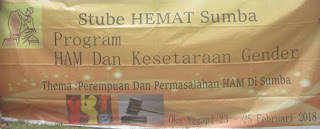 Training on Human Rights and Gender Equity with theme "Women and Human Rights Problems in Sumba" initiated by Stube-HEMAT Sumba is an effort to explore suchproblem. It was held on February 23-25, 2018 at GKS Okanggapi, branch of GKS Umamapu, Londalima, Kanatang, East Sumba and attended by thirty students from STT GKS Lewa, STT Terpadu, Unkriswina Sumba, Ana Humba Community and Nursing Academy.
Training on Human Rights and Gender Equity with theme "Women and Human Rights Problems in Sumba" initiated by Stube-HEMAT Sumba is an effort to explore suchproblem. It was held on February 23-25, 2018 at GKS Okanggapi, branch of GKS Umamapu, Londalima, Kanatang, East Sumba and attended by thirty students from STT GKS Lewa, STT Terpadu, Unkriswina Sumba, Ana Humba Community and Nursing Academy.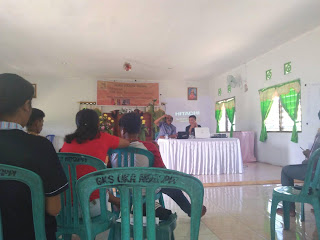 Several speakers were invited to facilitate the training, such as Y. Djami Yiwa, aculture practitioner, discussing human rights and gender equity based on Sumba culture. The culture itself is actually the outcome of deliberation of the ancestors to manage people’s life. There are some rules that still exist, such as social strata of society, deliberations of ancestors, division of customary duties and local laws, and Sumbanese’s way of life. Gender equity in Sumba appears during religious ceremonies, shown in task division for male to perform ceremonies while women prepare tools and materials, also in marriage ceremonies, farming and animal husbandry.
Several speakers were invited to facilitate the training, such as Y. Djami Yiwa, aculture practitioner, discussing human rights and gender equity based on Sumba culture. The culture itself is actually the outcome of deliberation of the ancestors to manage people’s life. There are some rules that still exist, such as social strata of society, deliberations of ancestors, division of customary duties and local laws, and Sumbanese’s way of life. Gender equity in Sumba appears during religious ceremonies, shown in task division for male to perform ceremonies while women prepare tools and materials, also in marriage ceremonies, farming and animal husbandry.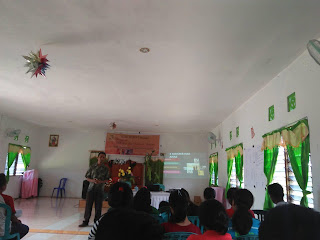 Ane Djara from Child Protection Agency (LPA) explained the implementation of Child and Women Protection Act in East Sumba. She said that women and children are assets of nation that must be protected from all forms of violence, so the perpetrators of violence will be punished. All elements of society, including young people and students were expected to be the front guard to fight for women and children’s rights.
Ane Djara from Child Protection Agency (LPA) explained the implementation of Child and Women Protection Act in East Sumba. She said that women and children are assets of nation that must be protected from all forms of violence, so the perpetrators of violence will be punished. All elements of society, including young people and students were expected to be the front guard to fight for women and children’s rights.Wanja Wairundi, head of Women's Empowerment and Family Planning office in East Sumba revealed cases that showed the victims of sexual assault cases were minors. The local government tries to fight violence against women and children through, 1) community socialization to prevent violence actions against women and children, as well as penalties for perpetrators, 2) assistance or rehabilitation of victims to restore mental trauma. He hoped for a closer cooperation with young people and students to report to the authorities if they find such cases in community.
The legal briefing was presented by Bripka Ida P.T. Yarmika, S.H, unit head of PPA of Criminal Investigation Unit in East Sumba Police. He described violation on women's rights and the treatment. Everyone is entitled to his or her fundamental rights without distinction of race and sex. This was affirmed by United Nations declaration on human rights in 1948 that women have rights in politics, citizenship, education and teaching, profession and employment, health and law. In the cases of rape victims, prostitutes in prostitution, abortion, pornography and trafficking of women, they are handlednormatively through legal side and another approach is throughlocal wisdom or it is done outside of court process based onwin-win solution.
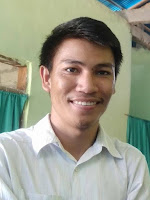 Jufri Adipapa, one of Stube-HEMAT Sumba team said, "Students as intellectual actors become information funnel for people to maintain security and comfort of community together. Living without discrimination, upholding human rights especially women and children rights. Furthermore, all participants should join follow-up plan (RTL) to commemorate International Women's Day on March 3, 2018."
Jufri Adipapa, one of Stube-HEMAT Sumba team said, "Students as intellectual actors become information funnel for people to maintain security and comfort of community together. Living without discrimination, upholding human rights especially women and children rights. Furthermore, all participants should join follow-up plan (RTL) to commemorate International Women's Day on March 3, 2018."The struggle for women and children rights is a long journey, and it starts from us and from now on. (Adriana Pindi Moki).
Have A Hope & God Will Hear A fellowship to open program of Stube-HEMAT Sumba
Monday, 22 January 2018by adminstube
The existence of Stube-HEMAT Sumba passing years since 2008 until now is merely God's grace. Stube facilitates young people and students through training and it is expected toyield better qualified people for brighter future.
 Many trainings held by Stube-HEMAT Sumba equip students in Sumba to get benefiteither as individu or community, such as making bamboo handicrafts worked by Danial Wolu Paraing in Kanjonga Bakul. He optimized bamboo to be profitablehandicrafts and his skill gave him a chance as teacher at one of junior high school in East Sumba. Then, Sumitro Umbu Ndamung, who studied farming on onions and chili in Yogyakarta, got an opportunity from Agriculture office toassist farmer groups in his village, Kombapari, Katala Hamu Lingu and source speaker for activities done by Stube activists for local community.
Many trainings held by Stube-HEMAT Sumba equip students in Sumba to get benefiteither as individu or community, such as making bamboo handicrafts worked by Danial Wolu Paraing in Kanjonga Bakul. He optimized bamboo to be profitablehandicrafts and his skill gave him a chance as teacher at one of junior high school in East Sumba. Then, Sumitro Umbu Ndamung, who studied farming on onions and chili in Yogyakarta, got an opportunity from Agriculture office toassist farmer groups in his village, Kombapari, Katala Hamu Lingu and source speaker for activities done by Stube activists for local community.
In 2018 Stube-HEMAT Sumba has several programs including Human Rights and Gender Equality, Organic Farming, Human Resource: Facing Global Challenges, and Tourism: Inventory of Cultural Heritage. Also Stube's additional programs, such as Journalism, Village & Me and Exposure to Stube-HEMAT Yogyakarta. To welcome the program in 2018, Stube-HEMAT Sumba held a fellowship and invited activists from several campuses and organization around Waingapu, Unkriswina, STT Terpadu, STT GKS Lewa, GMNI and IKPML.
 Twenty-six participants attended the fellowship served by Pdt. Dominggus Umbu Deta, S.Th, the coordinator of Stube-HEMAT Sumba. He preached the Word of God from Psalms 64: 1-11 which affirmsthat whatever we do must be based on God. There are two things, first, as young people, students or Stube-HEMAT activists, we hope to God as a refuge for the righteous who live honestly, faithfully and obediently against difficulties. As team and activists of Stube-HEMAT Sumba, do every job and responsibility with all the consequences and believe that God be with us.
Twenty-six participants attended the fellowship served by Pdt. Dominggus Umbu Deta, S.Th, the coordinator of Stube-HEMAT Sumba. He preached the Word of God from Psalms 64: 1-11 which affirmsthat whatever we do must be based on God. There are two things, first, as young people, students or Stube-HEMAT activists, we hope to God as a refuge for the righteous who live honestly, faithfully and obediently against difficulties. As team and activists of Stube-HEMAT Sumba, do every job and responsibility with all the consequences and believe that God be with us.
Second, the righteous people should depend on and hope to God's help. The believers have hope, not just praying, begging and asking for help, but need strong faith in God. There should betarget to be achieved within the next one year related with Stube-HEMAT Sumba program. It becomes power to be realize theory into actions. It is true that every ministry will face uneasy challenge, but Psalms encouragethe brave activists to declare faith as ‘a hope’ for God's help in every situation (verse 8-11).
At the end of the event, Stube-HEMAT Sumba facilitated dialogue with the participants regarding Stube-HEMAT and the programs. Participants expected collaboration among youth organizations and universities in East Sumba.
Stube-HEMAT Sumba is stepping to its tenth year. This is not just coincidence but it is solely God's grace. From a plan and hope Stube-HEMAT Sumba took part to equip young generation to compete in various fields for the sake of Sumba development.(Jufri Adipapa).




